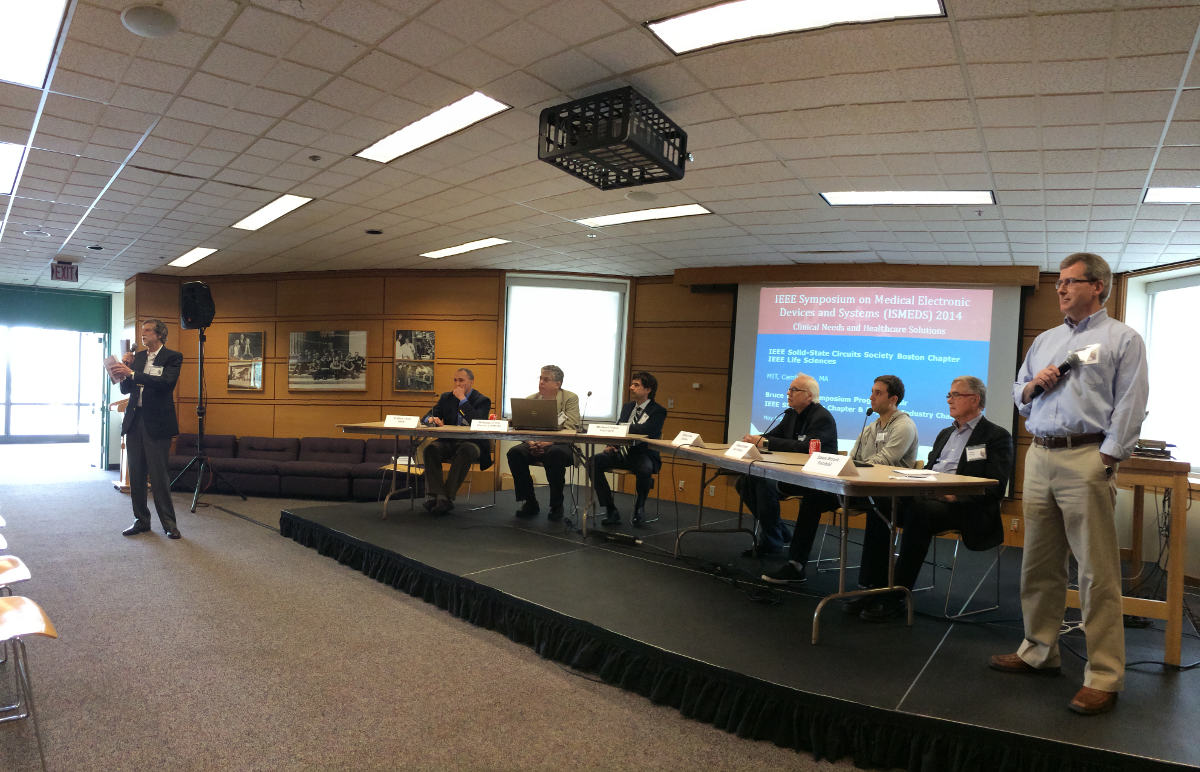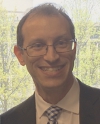First IEEE ISMEDS Symposium Builds on MEDRC Workshop for Medical Electronic Devices and Systems
By Bruce Hecht
The field of medical electronic devices and systems offers to bring radically improved diagnostics and treatments to people in diverse settings. The first IEEE ISMEDS Symposium was recently convened to explore and advance interdisciplinary collaboration in these fields. The Symposium was held at MIT’s Medical Device Realization Center (MEDRC), in Cambridge, Massachusetts on May 8th-9th, 2014.
Building on the 5-year history of the MIT Medical Device Realization Center (MEDRC) Workshop, this is the first year the event was extended through the support of the MEDRC, the IEEE Solid-State Circuits Society Boston Chapter, and the IEEE Life Sciences.

Advancements in medical devices are leveraging electronic miniaturization, information technology, and advanced manufacturing to gain improved diagnostics and treatment with clinical collaboration across these disciplines. The themes of the 2014 Symposium explored the intersection and blending of the clinical and the consumer, health and wellness perspectives and applications. Topics included biomedical analysis in resource-limited settings; measurement of brain, heart, and vital signs in clinical, home, and ambulatory environments; and the extension of human performance in sports and biomedical health.
Wearable technologies were in the spotlight as many new devices are emerging or proposed for health and wellness applications. The Symposium provided an engaging forum to examine these technologies, what problems they are designed to solve, and how will evidence and clinical-based methods help inform their use and adoption.
The 2014 ISMEDS Symposium opened with a welcome from Professor Charles Sodini, MIT, Cambridge, MA, Symposium General Chair and director of MIT’s MEDRC, and from MIT’s Arup Chakraborty, Director of IMES, the Institute for Medical Engineering and Science. Symposium Program Chair Bruce Hecht introduced the IEEE Boston Section, the IEEE Solid-State Circuits Society Boston Chapter, and the IEEE Life Sciences.
The keynote talk was presented by Professor George Whitesides, Woody & Ann Flowers University Professor at Harvard University, Cambridge, MA and founder of Diagnostics for All, who challenged the participants not to be limited by past technologies, methods, and mindsets. In his work dedicated to solving the unmet needs for improved healthcare around the world, professor Whitesides outlined how a changed perspective led him and his team to build paper-based microfluidics that will provide people with the access they need for critical diagnosis of their medical condition.
The first day continued with two contrasting sessions: one clinically focused on Home & Ambulatory Care, chaired by Brian Brandt of Maxim Integrated Products, and the second, Personal Healthcare for Wellness, chaired by Sudha Maniam of General Electric’s GE Global Research Center. In the first session, 1) Dr. John Kimura, of Sensorium, Vermont, presented Bio-Potential Sensors Measuring Brain Circuit Activity. 2) Dr. Sydney Cash, of Massachusetts General Hospital (MGH), Boston, MA, presented Prospects for Minimally Invasive Long Term Monitoring of Brain Function. 3) William Crone, of Physio Controls, Redmond, WA, described The Link Between the Hospital of the Future and Out-of-Hospital Care. 4) Dr. Michael Filbin, of Massachusetts General Hospital (MGH), Boston, MA, illustrated a case study on the Evolution of Human Clinical Trials for Early Septic Shock in the Emergency Department.
After a break for lunch and informal conversations, the 2nd session featured a contrasting perspective, how “quantified self” and other wellness and wearable technologies are emerging in response to people’s seeking to use portable sensors and systems to understand their own bodies. Here we heard from 1) Michael Luna, of Jawbone, San Francisco, CA, setting out a vision for Unlocking the Possibilities of Wearables to Manage Wellness. 2) Thomas Lipoma, of MIT-spinoff Rest Devices, Cambridge, MA, addressing Hospital to Home: the Growth of Wearable Technologies. 3) Dr. Janusz Bryzek, of TSensors Summit, Stanford, CA presented Amazing Sensor Based Fitness and Health Products, A Stepping Stone to TSensors (Trillion Sensors) based Healthcare for All.
Each day, the presenters from each of the sessions participated in an interactive panel with prepared questions from the moderators and open questions from the audience. In the first day’s panel, moderated by Professor Charles Sodini and Tom O’Dwyer of Analog Devices, the speakers highlighted the opportunity to combine a clinical focus with patient’s own measured data. Following the panel, a lightening round of 90-second talks introduced 17 posters from students, post-doctoral researchers, and industry participants. Poster presenters and viewers were invited to a reception while discussing their research and the day’s talks.
Day 2 of the Symposium returned to the format of two contrasting sessions comparing Clinical Monitoring with Sports Performance & Biomedicine. In the first, Professor Thomas Heldt of MIT opened this session on Clinical Monitoring which featured 1) Dr. Marilyn Moy, of Brigham & Women’s Hospital (BWH), Boston, MA, urging that Every Step Counts in COPD (Chronic Obstructive Pulmonary Disease). 2) Professor Omer Inan, of Georgia Institute of Technology, Atlanta, GA, presenting Non-Invasive Physiological Monitoring Technologies for Human Health and Performance. 3) Professor Steffen Leonhardt, of RWTH Aachen University, Germany, presenting Contact-Free Methods for Clinical Monitoring. This was followed by the Sports Performance/Biomedicine session chaired by Bruce Hecht, of Analog Devices. 1) Jeff Chu, of Simbex, Lebanon, NH, addressed Extracting Meaningful Information from the Field: Tackling Head Injury to Help Preserve American Football. 2) Dr. Paolo Bonato, of Harvard Medical School, and Spaulding Rehabilitation Hospital, Boston, MA, described The Medical Home of the Future: How Mobile Health Technology is Changing Medicine.
The second speaker panel was moderated by Professor Brian Anthony, of MIT Mechanical Engineering, and Kai Thomenius, GE (retired) and visiting scientist at MIT. The recurring themes of vital signs, portable sensors, and mobile technology were highlighted as the speakers, moderators, and participants engaged in lively dialog and put forward a range of ideas. The conference concluded with an informal lunch and enthusiasm for continued collaboration and looking forward to meeting again at future events.
Many thanks to the Technical Program Committee, and the support of MIT and the MEDRC, the Solid-State Circuits Society and its support of the IEEE Boston Section’s SSCS Chapter, and the IEEE Life Sciences Technical Community, as well as to the speakers and the poster session presenters, and to all of our participants. Thanks to Coleen Milley and her staff who provided a flawless delivery of the organization and realization of an excellent conference! We look forward to see you all at our next event, currently in planning for 2015.

Additional information about the Symposium is available at the event’s web site: http://www.IEEE-ISMEDS.org.
Contributor
 Bruce Hecht received the M.A.Sc. and B.A.Sc. degrees in Electrical Engineering from the University of Waterloo, Ontario, Canada. Originally from Montreal, Quebec, he joined Analog Devices in 1994, where he is currently with the Worldwide Quality Systems Engineering Group in Wilmington, MA, USA. His interests are in design of all kinds of electronic systems for medical, automotive, industrial, consumer, and communications systems. Read more
Bruce Hecht received the M.A.Sc. and B.A.Sc. degrees in Electrical Engineering from the University of Waterloo, Ontario, Canada. Originally from Montreal, Quebec, he joined Analog Devices in 1994, where he is currently with the Worldwide Quality Systems Engineering Group in Wilmington, MA, USA. His interests are in design of all kinds of electronic systems for medical, automotive, industrial, consumer, and communications systems. Read more







 Bruce Hecht received the M.A.Sc. and B.A.Sc. degrees in Electrical Engineering from the University of Waterloo, Ontario, Canada. Originally from Montreal, Quebec, he joined Analog Devices in 1994, where he is currently with the Worldwide Quality Systems Engineering Group in Wilmington, MA, USA. His interests are in design of all kinds of electronic systems for medical, automotive, industrial, consumer, and communications systems.
Bruce Hecht received the M.A.Sc. and B.A.Sc. degrees in Electrical Engineering from the University of Waterloo, Ontario, Canada. Originally from Montreal, Quebec, he joined Analog Devices in 1994, where he is currently with the Worldwide Quality Systems Engineering Group in Wilmington, MA, USA. His interests are in design of all kinds of electronic systems for medical, automotive, industrial, consumer, and communications systems.  Sydney S. Cash received his MD and PHD from Columbia University in New York City. He is now an Associate Professor in the Epilepsy Division of the Neurology Department at Massachusetts General Hospital and at Harvard University. He is also a member of the BrainGate clinical trial team, Co-director of the Department of Neurology NeuroTechnology Trials Unit and clinical trials director of the New England Pediatric Device Consortium. Current research in Dr. Cash's lab is, broadly speaking, dedicated to trying to understand normal and abnormal brain activity, particularly oscillations, using multi-modal and multi-scalar approaches. This includes a focus on the development of novel neurotechnological approaches to help diagnose and treat common and devastating neurological diseases.
Sydney S. Cash received his MD and PHD from Columbia University in New York City. He is now an Associate Professor in the Epilepsy Division of the Neurology Department at Massachusetts General Hospital and at Harvard University. He is also a member of the BrainGate clinical trial team, Co-director of the Department of Neurology NeuroTechnology Trials Unit and clinical trials director of the New England Pediatric Device Consortium. Current research in Dr. Cash's lab is, broadly speaking, dedicated to trying to understand normal and abnormal brain activity, particularly oscillations, using multi-modal and multi-scalar approaches. This includes a focus on the development of novel neurotechnological approaches to help diagnose and treat common and devastating neurological diseases.  Michael Filbin, MD, is an emergency physician at Massachusetts General Hospital and Assistant Professor at Harvard Medical School. Dr. Filbin attended medical school at Baylor College of Medicine and did his residency training in the Harvard-Affiliated Emergency Medicine Residency (HAEMR) program. Dr. Filbin's research interest is in human clinical trials of septic shock with a particular focus on early identification and intervention.
Michael Filbin, MD, is an emergency physician at Massachusetts General Hospital and Assistant Professor at Harvard Medical School. Dr. Filbin attended medical school at Baylor College of Medicine and did his residency training in the Harvard-Affiliated Emergency Medicine Residency (HAEMR) program. Dr. Filbin's research interest is in human clinical trials of septic shock with a particular focus on early identification and intervention.  Omer T. Inan is an Assistant Professor of Electrical and Computer Engineering at the Georgia Institute of Technology, where he researches physiological and biomedical sensing and monitoring. He received his PhD in Electrical Engineering from Stanford University.
Omer T. Inan is an Assistant Professor of Electrical and Computer Engineering at the Georgia Institute of Technology, where he researches physiological and biomedical sensing and monitoring. He received his PhD in Electrical Engineering from Stanford University.